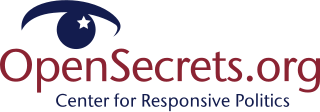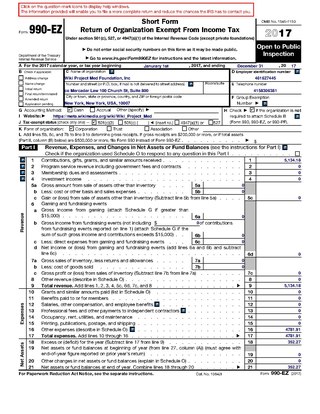
A charitable organization or charity is an organization whose primary objectives are philanthropy and social well-being.
United States non-profit laws relate to taxation, the special problems of an organization which does not have profit as its primary motivation, and prevention of charitable fraud. Some non-profit organizations can broadly be described as "charities" — like the American Red Cross. Some are strictly for the private benefit of the members — like country clubs, or condominium associations. Others fall somewhere in between — like labor unions, chambers of commerce, or cooperative electric companies. Each presents unique legal issues.

OpenSecrets is a nonprofit organization based in Washington, D.C., that tracks data on campaign finance and lobbying. It was created from a merger of the Center for Responsive Politics (CRP) and the National Institute on Money in Politics (NIMP).
A 501(c) organization is a nonprofit organization in the federal law of the United States according to Internal Revenue Code and is one of over 29 types of nonprofit organizations exempt from some federal income taxes. Sections 503 through 505 set out the requirements for obtaining such exemptions. Many states refer to Section 501(c) for definitions of organizations exempt from state taxation as well. 501(c) organizations can receive unlimited contributions from individuals, corporations, and unions.

NatureServe, Inc. is a non-profit organization based in Arlington County, Virginia, US, that provides proprietary wildlife conservation-related data, tools, and services to private and government clients, partner organizations, and the public. NatureServe reports being "headquartered in Arlington, Virginia, with regional offices in four U.S. locations and in Canada." In calendar year 2011 they reported having 86 employees, 6 volunteers, and 15 independent officers.
Saul Kent is a life extension activist, and co-founder of the Life Extension Foundation, a dietary supplement vendor and promoter of anti-aging research. He is also a pioneer in the practice of cryonics, and was a board member of the cryonics organization Alcor Life Extension Foundation.
Bob Jones University v. Simon, 416 U.S. 725 (1974), is a decision by the Supreme Court of the United States holding that Bob Jones University, which had its 501(c)(3) status revoked by the Internal Revenue Service for practicing "racially discriminatory admissions policies" towards African-Americans, could not sue for an injunction to prevent losing its tax-exempt status. The question of Bob Jones University's tax-exempt status was ultimately resolved in Bob Jones University v. United States, in which the court ruled that the First Amendment did not protect discriminatory organizations from losing tax-exempt status.
Following is a list of topics related to life extension:
A 501(c)(3) organization is a United States corporation, trust, unincorporated association or other type of organization exempt from federal income tax under section 501(c)(3) of Title 26 of the United States Code. It is one of the 29 types of 501(c) nonprofit organizations in the US.
Internal Revenue Service (IRS) tax forms are forms used for taxpayers and tax-exempt organizations to report financial information to the Internal Revenue Service of the United States. They are used to report income, calculate taxes to be paid to the federal government, and disclose other information as required by the Internal Revenue Code (IRC). There are over 800 various forms and schedules. Other tax forms in the United States are filed with state and local governments.
The Lupus Foundation of America (LFA), founded in 1977, is a national voluntary health organization based in Washington, D.C., with a network of chapters, offices and support groups located in communities throughout the United States. The Foundation is devoted to solving the mystery of lupus. Its mission is to improve the quality of life for all people affected by lupus through programs of research, education, support and advocacy.

A private foundation is a tax-exempt organization not relying on broad public support and generally claiming to serve humanitarian purposes. The Bill & Melinda Gates Foundation is the largest private foundation in the U.S. with over $38 billion in assets. Most private foundations are much smaller. Out of the 84,000 private foundations that filed with the IRS in 2008, approximately 66% have less than $1 million in assets, and 93% have less than $10 million in assets. In aggregate, private foundations in the U.S. control over $628 billion in assets and made more than $44 billion in charitable contributions in 2007.
We the People Foundation for Constitutional Education, Inc. also known as We the People Foundation is a non-profit education and research organization in Queensbury, New York with the declared mission "to protect and defend individual Rights as guaranteed by the Constitutions of the United States." It was founded by Robert L. Schulz. At the U.S. Department of Justice, he is known as a "high-profile tax protester". The Southern Poverty Law Center asserts that Schulz is the head of the leading organization in the tax protester movement. The organization formally served a petition for redress of grievances regarding income tax upon the United States government in November 2002. In July 2004, it filed a lawsuit in an unsuccessful attempt to force the government to address the petition. The organization has also served petitions relating to other issues since then.

Form 990 is a United States Internal Revenue Service form that provides the public with financial information about a nonprofit organization. It is often the only source of such information. It is also used by government agencies to prevent organizations from abusing their tax-exempt status. Certain nonprofits have more comprehensive reporting requirements, such as hospitals and other health care organizations.
The Mortgage Forgiveness Debt Relief Act of 2007 was introduced in the United States Congress on September 25, 2007, and signed into law by President George W. Bush on December 20, 2007. This act offers relief to homeowners who would have owed taxes on forgiven mortgage debt after facing foreclosure. The act extends such relief for three years, applying to debts discharged in calendar years 2007 through 2009. With the Emergency Economic Stabilization Act of 2008, this tax relief was extended another three years, covering debts discharged through calendar year 2012. The relief was further extended until January 1, 2014, at Section 202 of the American Taxpayer Relief Act of 2012.
Nonpartisanism in the United States is organized under United States Internal Revenue Code that qualifies certain non-profit organizations for tax-exempt status because they refrain from engaging in certain political activities prohibited for them. The designation "nonpartisan" usually reflects a claim made by organizations about themselves, or by commentators, and not an official category per American law. Rather, certain types of nonprofit organizations are under varying requirements to refrain from election-related political activities, or may be taxed to the extent they engage in electoral politics, so the word affirms a legal requirement. In this context, "nonpartisan" means that the organization, by US tax law, is prohibited from supporting or opposing political candidates, parties, and in some cases other votes like propositions, directly or indirectly, but does not mean that the organization cannot take positions on political issues.
The Foundation for Moral Law is a socially conservative, Christian right legal advocacy group based in Montgomery, Alabama.
Form 1023 is a United States IRS tax form, also known as the Application for Recognition of Exemption Under 501(c)(3) of the Internal Revenue Code. It is filed by nonprofits to get exemption status. On January 31st of 2020, the IRS abandoned the paper format of the form 1023. Those who used the paper version were given 90 days grace period and that ended on 30th of April 2020. Going forward, every application has to be filed online through Pay.gov portal.
A 501(h) election or Conable election is a procedure in United States tax law that allows a 501(c)(3) non-profit organization to participate in lobbying limited only by the financial expenditure on that lobbying, regardless of its overall extent. This allows organizations taking the 501(h) election to potentially perform a large amount of lobbying if it is done using volunteer labor or through inexpensive means. The 501(h) election is available to most types of 501(c)(3) organizations that are not churches or private foundations. It was introduced by Representative Barber Conable as part of the Tax Reform Act of 1976 and codified as 26 U.S.C. § 501(h), and the corresponding Internal Revenue Service (IRS) regulations were finalized in 1990.
William “Bill” Faloon is an author, life extensionist, and co-founder of the Life Extension Foundation, the Church of Perpetual Life, and the FDA Holocaust Museum.





